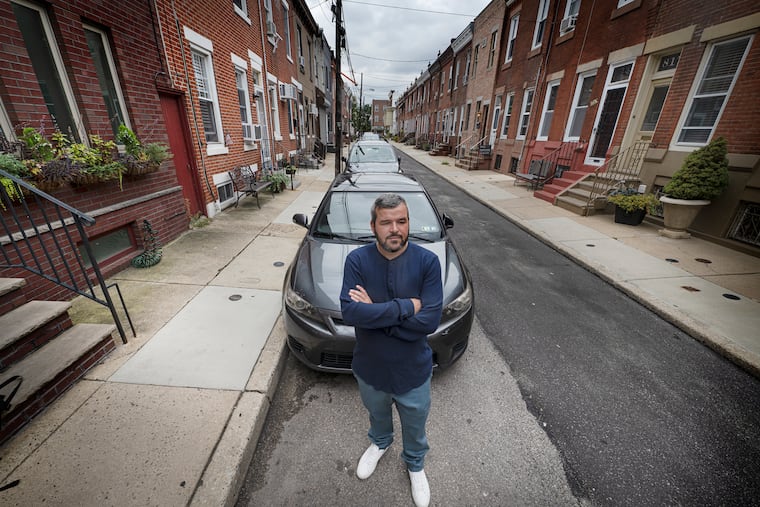Philly pays $30K to two ‘courtesy’ tow victims, but class-action suit continues
The city has settled with two people whose cars were towed from legal parking spots into illegal spots, then ticketed. Two others have refused Philadelphia's offer.

In November 2020, Matt Allen’s car mysteriously disappeared from his parking spot on a street near his South Philadelphia home.
The 36-year-old software developer has been around long enough to know what happened: His 2012 Scion tC wasn’t stolen. It had been “courtesy” towed — for the second time.
That’s the Philly euphemism for what is formally known as “relocation towing” — when the police department, Philadelphia Parking Authority, or a private towing company moves vehicles from legal parking spots for special events, construction or emergencies.
Problem is, the city doesn’t have a modern, reliable way to track the vehicles’ new locations, leaving owners wandering the streets for days or weeks, looking for their cars.
Some owners are forced to pay hefty fines and fees when their vehicles are moved to illegal spots and subsequently ticketed by the PPA, then sometimes booted or towed again.
» READ MORE: ‘Borderline illegal’: Courtesy tows remain Philly’s persistent parking nightmare
Allen had his car courtesy towed twice in 2020. Both times, no one in the city had any idea where it was dropped off.
“What an insane program,” he said.
The first time, Allen eventually “got lucky” and stumbled upon his car about a mile away. No tickets.
The second time, however, it was relocated to a street behind the Wawa on Delaware Avenue where it racked up about $400 in tickets.
Allen ended up paying the money. He didn’t know who’d towed his car. How could he prove he hadn’t parked there?
“I tried to fight the tickets, but I didn’t have proof it was towed,” Allen said. “It’s almost like a shadow industry. It feels like you’re getting bullied, to be honest.”
» READ MORE: Car ticketed, impounded by Philadelphia Parking Authority after sign switcheroo. PPA admits $475 error.
But here’s where Allen’s experience takes a sharp turn from the typical courtesy-tow horror story:
The city just offered him $15,000. He fought the system and won.
In May 2021, Allen and three other drivers sued the city in federal court as part of a potential class-action case aimed at forcing city government to fix the program.
“There’s a whole laundry list of improvements that can be made and we think should be made,” said Joseph Kohn, part of the legal team that initiated the suit.
Instead of doing that, however, the city offered each of the plaintiffs $15,000.
Allen and another plaintiff have accepted the offer. The two other plaintiffs, according to their attorneys, are expected to reject the settlements and move forward with the case. City spokesperson Kevin Lessard declined to comment on the suit because it is ongoing.
The Inquirer has been writing about the courtesy-tow problem for nearly the past three years. Complaints continue to come in. No city official or agency appears to have taken any steps to fix this Philadelphia “courtesy.”
» READ MORE: ‘Courtesy’ towing claims more victims during filming of Adam Sandler’s ‘Hustle’
“I’m not a computer expert, but it seems there are things you can do,” Kohn said, mentioning Chicago, which uses an online searchable database. “It should be relatively straightforward.”
(Since 2019 the PPA has maintained a searchable database of cars it has towed, but the authority itself does not handle most courtesy tows).
The lawsuit alleges the victims have been “unreasonably and arbitrarily” deprived of their vehicles without due process, in violation of the Fourth and Fourteenth Amendments.
One of the plaintiffs who is pushing ahead with the lawsuit is Mary Henin, a public defender who was pulled over by police in New Jersey in 2020 and ordered out of her Nissan at gunpoint.
Henin was placed in handcuffs because police in New Jersey thought the car was stolen. That was because, months earlier, the car had been courtesy towed in West Philly, and she reported it stolen as police advised. Henin followed up with Philadelphia police when she later found her car, but they mistakenly left it in the stolen-vehicle database.
“My sergeant on the scene received information from Philly PD, who said, ‘Go ahead. Lock her up. It’s [a] good [arrest],’” Long Beach Township Police Chief Anthony Deely said in 2020. “My sergeant went the extra yard because she had documentation.”
» READ MORE: Did you get a courtesy tow in Philly? Here’s what to do.
The Inquirer reported on a nearly identical case last year, when a woman was pulled over in Virginia for driving her own car, which had previously been courtesy towed in Philadelphia.
As for Allen, he said he’s glad the federal case against the city is continuing. But he couldn’t pass up the $15,000. He has no idea where the city came up with that number. It’s way more than he was expecting.
“Hearing $15,000, I couldn’t even believe it,” he said. “It kind of felt like a joke.”